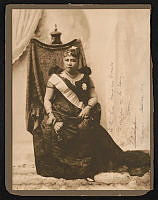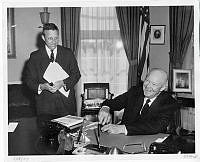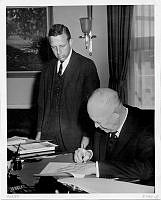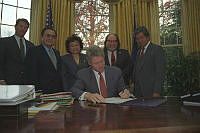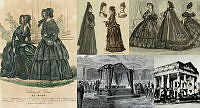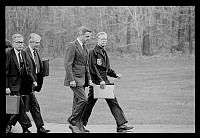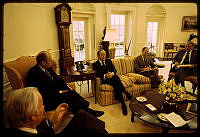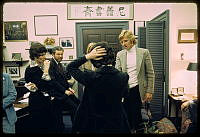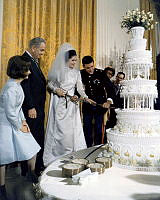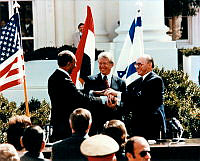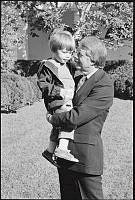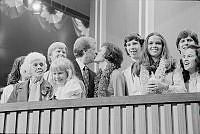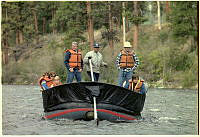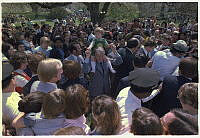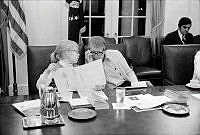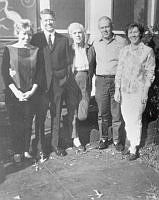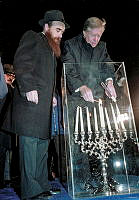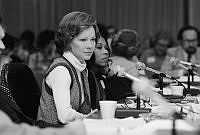Ulysses S. Grant

On April 27, 1822, Ulysses S. Grant was born in Point Pleasant, Ohio. Grant’s father, Jesse, was a tanner and an abolitionist. Grant received an education from several private schools and later attended the United States Military Academy at West Point. After graduating in the middle of his class, Grant was stationed in Missouri where he visited with his former classmate and friend, Fred Dent. During the visit, Grant met Fred’s sister, Julia, and fell in love with her. In 1848, they married and would go on to raise four children together.
After the outbreak of the Mexican-American War, Grant fought under General Zachary Taylor before resigning from the military in 1854. Julia, Ulysses, and their children moved back to her father’s plantation, White Haven, in Missouri. Grant became a plantation manager, overseeing the enslaved and free laborers while working alongside them. While there are no known documents or letters related to a bill of sale, Grant did emancipate a man named William Jones in 1859. According to the signed manumission, Jones was “purchased by me [Grant] of Frederick Dent.” Jones is the only known enslaved individual who was owned by Grant—though his decision to free William rather than sell him, especially as he struggled financially, suggests that Grant had personal discomfort with slave ownership. Julia, however, had no qualms about using enslaved labor within her household and she considered those owned by her father Frederick Dent as her own. Click here to learn more about the enslaved households of President Ulysses Grant.
At the onset of the Civil War, the Grants were living in Illinois after the family suffered more financial setbacks in Missouri. Ulysses was working in his father's leather store in Galena when Governor John Wood appointed him commander of an unruly volunteer regiment. By September 1861, Grant had instilled order and discipline within the unit and was rewarded with a promotion to brigadier general of the volunteer force.
In his new position, Grant captured Fort Henry and attacked Fort Donelson. When the Confederate commander asked for Grant’s terms, he replied, "No terms except an unconditional and immediate surrender can be accepted." The Confederates surrendered, and President Abraham Lincoln promoted Grant to major general of volunteers. A few months later, Grant secured a hard-fought victory at the Battle of Shiloh, one of the bloodiest battles in the Western Theater. The casualties concerned some officials enough to call for Grant’s removal. President Lincoln defended Grant by saying, "I can't spare this man, he fights."
Grant then turned his attention to Vicksburg—its location on the banks of the Mississippi River made it a key city for moving troops and supplies. On July 4, 1863, Confederate troops surrendered to Grant after a two-month siege, even though many had considered the fort at Vicksburg impregnable. Grant then followed this success by capturing Chattanooga and its important railroad depot, pushing Confederates back into Georgia. In March 1864, Lincoln appointed Grant general-in-chief. Grant’s success can be credited to his military strategies and maneuvers, which made him remarkably different from his predecessors. He engaged the enemy in all theatres, drawing them into the open while exhausting their resources. His tactical planning and pursuit of General Robert E. Lee’s forces brought the war to a close on April 9, 1865, at Appomattox Court House. With Lincoln’s approval, General Grant offered generous terms of surrender that would prevent treason trials and executions.
During the years immediately following the war, General Ulysses S. Grant criticized President Andrew Johnson’s Reconstruction plan and aligned himself with Radical Republicans. In the 1868 election, Grant, a military hero and symbol of the Union victory, won in a landslide.
President Grant sent federal troops to the South to enforce civil rights legislation and protect African Americans from civil and political violence. With the assistance of Congress, Grant created the Department of Justice and instructed Attorney General Amos T. Akerman to suppress the newly formed Ku Klux Klan’s efforts to disenfranchise and terrorize black communities.
Although personally a man of unquestioned honesty, Grant’s reputation suffered from those around him. The president was often seen with two of his friends, speculators Jay Gould and James Fisk. When Grant discovered their scheme to corner the market in gold, he authorized Secretary of the Treasury George Boutwell to sell enough gold to undermine their plans. The speculation had already damaged the American economy, however, and Grant took the blame for his poor judgment in associates. Some Republican reformers seized on the scandal, accused the administration of corruption, and nominated Horace Greeley for president. The general's allies in the Republican Party were able to fend off these attacks and Grant was reelected with an overwhelming majority of the vote in 1872. However, scandal continued to follow his administration, most notably in 1875 with the discovery of the Whiskey Ring. This was an extensive network of distillers, intermediaries, and government officials who engaged in bribery and extortion to avoid federal taxes on liquor. President Grant’s private secretary, Orville E. Babcock, was indicted as part of the investigation but later acquitted when Grant testified on his behalf.
After retiring from the presidency, Grant’s long history of financial struggles continued. He joined a financial firm, which went bankrupt, and then learned he was suffering from throat cancer in late 1884. He worked furiously to write his memoirs to pay off his debts and provide for his family. These memoirs, completed just before he died on July 23, 1885, earned nearly $450,000. Grant’s autobiography was lauded for its lucid prose and compelling story. Grant argued that the Mexican-American War and the expansion of slavery ultimately drove the country toward civil war. It is still regarded as one of the best first-hand accounts of the Civil War.







